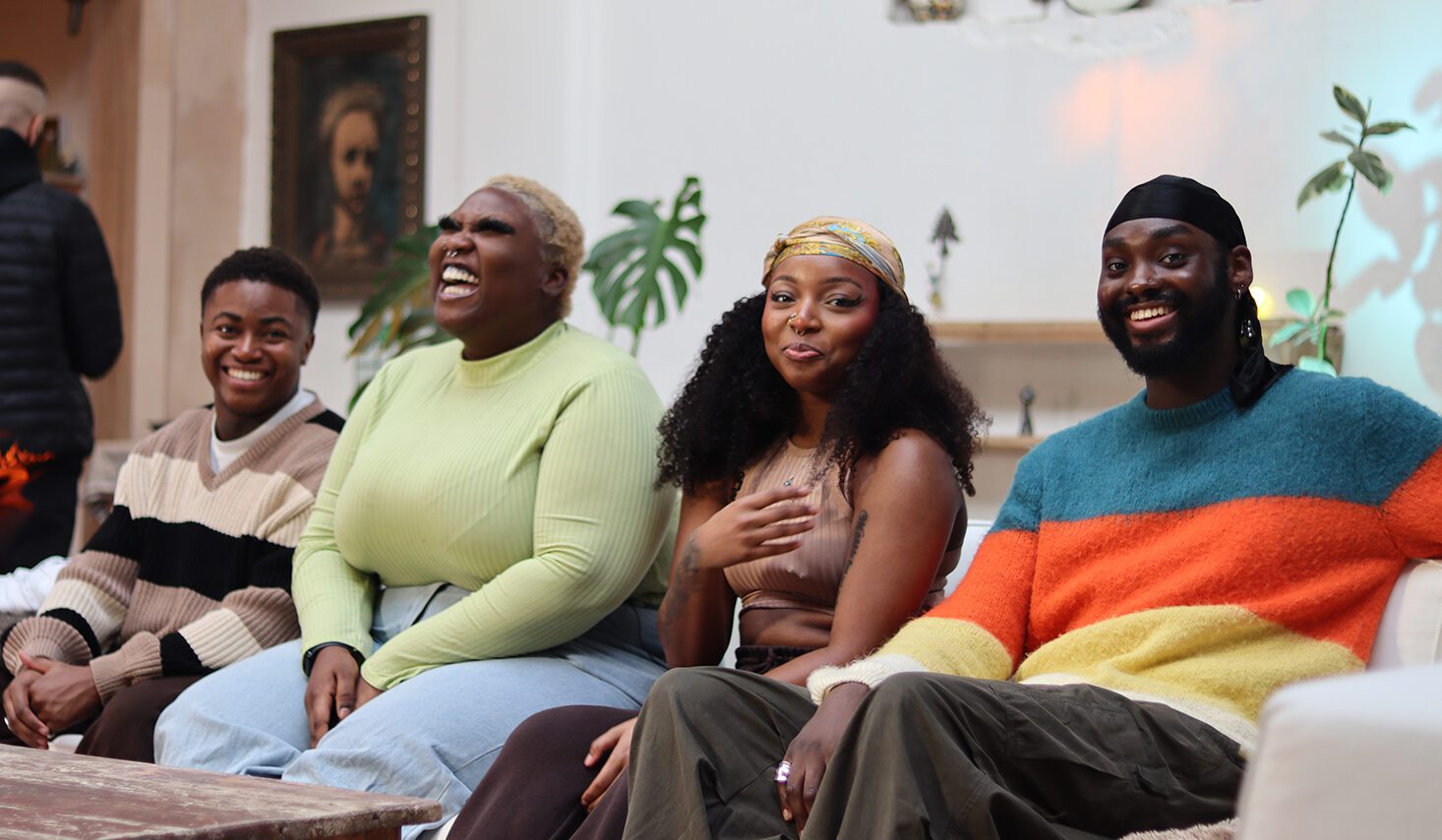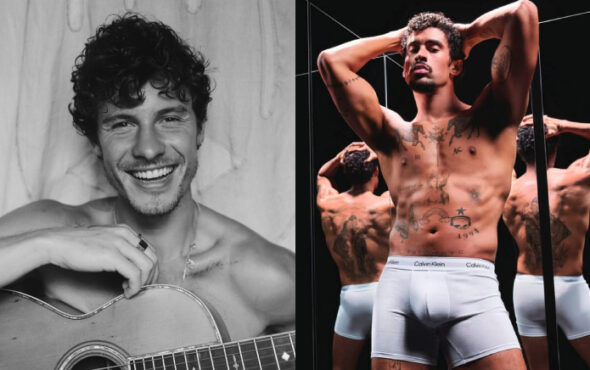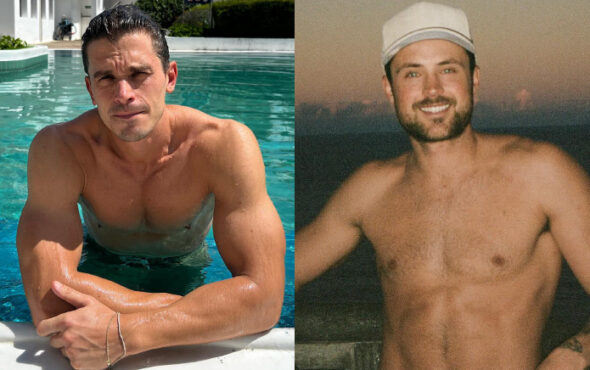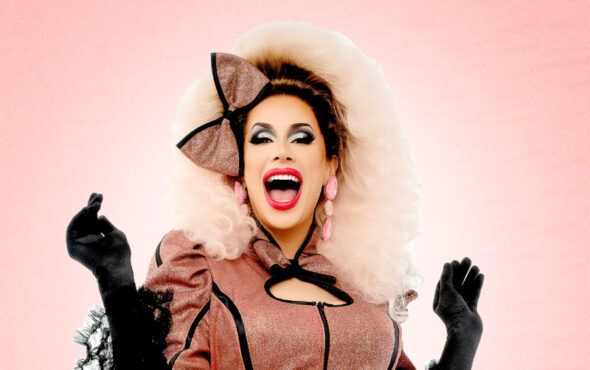
“I moved to London and I experienced this amazing Black, queer creative community and I realised that there are so few spaces for us to be unapologetically ourselves,” says Miracle Hurd, a creative director from London. “We’re in a really exciting time in the UK where Black digital creators are being platformed by mainstream outlets but while that is happening, we’re not seeing the same representation of Black, queer creators.” Echoes of Miracle’s desire for increased representation ring throughout Black, Queer and Right Here – a GAY TIMES series which spotlights Black LGBTQ+ innovators in the UK and beyond. Having grown up in an age where YouTubers were the celebrities whose pictures adorned teenage bedrooms and podcasters have become authorities of social commentary, Miracle, armed with her understanding of digital media created BLKQR TV, a YouTube talk show and social media platform which aims to give Black, queer people a space to talk, share and connect.
The concept of BLKQR TV appears simple: it is an online talk show and social media platform designed to give queer, Black Brits a forum to discuss the issues that matter to them. It was created to cater to a community that Miracle believes is currently being underserved. “I wanted to make something that depicts the Black queer experience with nuance and doesn’t try to conflate our experiences into a single story.” The show takes the format of a talk show; each episode a panel of participants discuss a range of community-centred topics before playing games that focus on themes of culture, identity and society. “We want to keep it lighthearted but also interesting and informative. The aim is to create something for us, by us that is also able to share some insight into what life as a Black, queer person can entail – outside of the hardship that is usually associated with our lives,” Miracle says.
Striking the balance, however, between broaching intra-community discussions whilst remaining inclusive to a wider audience is a challenge that the show must navigate sensitively. “When we were conceptualising discussion points we ran our ideas past trusted straight friends and it was eye-opening. We’d get their feedback and realise that we risked alienating some of our audience because some of the topics that seemed self-evident to us needed to be contextualised for those outside of our community,” Miracle shares. “I think it’s through something like what we’re creating here that we could start to bridge gaps. I don’t mind that we’re sometimes having to take our discussions back to basics because how else are people going to be able to learn about our experience?”
Though Black, queer voices are emerging through new media forms (Two Twos Podcast, a culture and society show fronted by Black lesbians Nana Duncan and Rose Frimpong boasts a five star rating on Spotify) BLKQR TV is the first UK based web series of its kind. The growth of TikTok has catapulted the careers of some Black, queer figures such as Dréya Mac. However, TikTok’s short form video model has meant that the app’s highest performers are often individual creators rather than collectives, meaning that the gap in Black, queer focused community and culture entertainment remains prominent
Explaining why she thinks this is the case Miracle shares: “Black queer representation in online spaces can be tokenistic at times. We might be included to mark things like Pride Month or to speak on certain trends and events, but we don’t really have many platforms that continuously centre us beyond these moments.”
Studying Brand Identity Design at university gave Miracle some of the skills and contacts to begin creating BLKQR TV. She also credits her experience to her time working as a content creator on the hit web series Chicken Shop Date. “Working on Chicken Shop Date gave me the full insight on how the process works, from idea to shoot, right through to post-production.”
This expertise has been instrumental in producing BLKQR TV on a tight budget. “Getting things done isn’t cheap! But community is the backbone of this project, we wouldn’t have access to a lot of the materials we used to film without the goodwill of the various people in our networks who have helped us.” Many of the crew as well as the show’s participants currently volunteer their time whilst much of the production equipment is borrowed or donated. To Miracle, this show of support is hugely positive. “Despite being a brand new production, I’ve been able to create a full team of people who are equally as passionate about this as me. It just shows how much support there is for what we’re creating. People want the show to exist.”
Deciding upon YouTube as the show’s principal platform may be unexpected as digital platforms mass pivot towards prioritising short-form content, but Miracle explains the intentions behind this choice: “We chose to create a YouTube show over a podcast or TikTok series because we wanted to discuss our topics without time constraints and we wanted the audience interaction that a comment section provides. As someone with ADHD I’m very visual-orientated and I wanted to create something that people can dip in and out of without needing to commit to consuming an entire episode at once.”
Since the release of the first episode, feedback has been steadily positive and as the show develops, the goal is expansion through sponsorship and advertising. Yet, within the search for sponsorship the intention behind BLKQR TV remains firm. Miracle insists: “We’re looking for brands that make sense for us and our community; whether that’s Black-owned businesses or companies that have previously shown authentic dedication to our causes.”
For Miracle, BLKQR TV is truly a labour of love and her lasting message only affirms the sense of heart at the webseries’ core. “If this had existed just six or seven years ago, I know I would have found it incredibly helpful so I just hope that it can have the same effect for someone else.”


